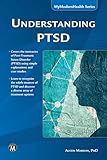Understanding PTSD / Austin Mardon.
Material type: TextPublisher: Dulles, VA : Mercury Learning and Information, [2024]Copyright date: 2024Description: 1 online resourceContent type:
TextPublisher: Dulles, VA : Mercury Learning and Information, [2024]Copyright date: 2024Description: 1 online resourceContent type: - 9781501522871
- 9781501519888
- 9781501519857
- 616.85
- online - DeGruyter
- Issued also in print.
| Item type | Current library | Call number | URL | Status | Notes | Barcode | |
|---|---|---|---|---|---|---|---|
 eBook
eBook
|
Biblioteca "Angelicum" Pont. Univ. S.Tommaso d'Aquino Nuvola online | online - DeGruyter (Browse shelf(Opens below)) | Online access | Not for loan (Accesso limitato) | Accesso per gli utenti autorizzati / Access for authorized users | (dgr)9781501519857 |
Frontmatter -- Contents -- Introduction: A College Student’s Story -- Chapter 1: The History of Psychotraumatology -- Chapter 2: PTSD Myths -- Chapter 3: How to Assess -- Chapter 4: How the Brain Copes with Different Types of Trauma -- Chapter 5: Potential Causes of PTSD -- Chapter 6: The Dangers of PTSD -- Chapter 7: Different Types of PTSD -- Chapter 8: The Physiological, Psychological, and Behavioral Response to Trauma and PTSD -- Chapter 9: Symptoms of PTSD -- Chapter 10: PTSD in Different Age Groups -- Chapter 11: Treatments -- Chapter 12: Other Risks (Comorbidity) -- Chapter 13: What Is Still Unknown? -- Chapter 14: Current and Future Research -- Chapter 15: The General Public’s Knowledge About PTSD -- Chapter 16: How PTSD Is Portrayed in Media -- Chapter 17: PTSD and the Family -- Chapter 18: Recovery and How to Support Someone with PTSD -- Chapter 19: Epilogue -- Chapter 20: PTSD Resources in North America, Europe, and India -- Appendix: Potential Pharmacological Treatments for Posttraumatic Stress Disorder -- Index
restricted access online access with authorization star
http://purl.org/coar/access_right/c_16ec
This book explores the complexities of Post-Traumatic Stress Disorder, offering an accessible guide for those without prior knowledge of the condition. This comprehensive resource traces the historical roots of PTSD, debunks common myths, and explains its various symptoms and types across different age groups. Readers will gain insights into the brain's response to trauma, potential causes, and the physiological, psychological, and behavioral impacts of PTSD. The book explores diverse treatment options, from cognitive therapy and physical activity to medications and alternative methods like animal therapy and hypnosis. Practical advice on coping mechanisms, recognizing subtle nuances of PTSD, and fostering community support is provided to empower readers in supporting those affected. Additionally, it addresses the portrayal of PTSD in media and current and future research. The book serves as an invaluable resource for understanding, navigating, and overcoming the challenges posed by this condition. Whether you're struggling with PTSD, supporting someone who is, or simply seeking to understand this condition, this book provides the knowledge and tools you need.FEATURES-Written in easy-to-understand language, making complex concepts approachable for all readers-Debunks common misconceptions about PTSD, such as the belief that only the weak are affected or that it's exclusively a soldier's ailment-Discover a wide range of web resources, including pharmacological treatment options, from cognitive therapy and physical activity to medications and alternative methods like animal therapy and hypnosis
Issued also in print.
Mode of access: Internet via World Wide Web.
In English.
Description based on online resource; title from PDF title page (publisher's Web site, viewed 20. Nov 2024)


